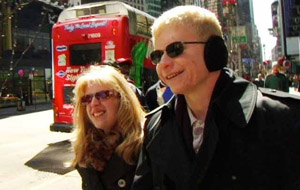August 27, 2012 - By Susan Ipaktchian

A documentary about rare diseases features Ashley Appell (left), who has Hermansky-Pudlak Syndrome, shown here as she begins a romance with a young man who also has HPS.
Warmth and persistence are powerful weapons, and Donna Appell wields them like a pro.
Appell's daughter, Ashley, was an infant when she was diagnosed with Hermansky-Pudlak Syndrome, a rare genetic disorder that is associated with albinism and has symptoms that include blindness, bleeding problems, colitis and, in some cases, a pulmonary fibrosis that often claims HPS patients in their 20s or 30s. Since her daughter's diagnosis, Appell has pressed forward to form a network of support for those with HPS and their families, and to work with doctors at the National Institutes of Health to look for a possible treatment.
Rare, a feature documentary by filmmakers at the Stanford University School of Medicine, provides insight into the world of patient-advocacy groups, like the one that Apell has created. An estimated 30 million people in the United States have some sort of rare disease, and more than 250 million people in the world suffer from one. For many of them, patient-advocacy groups provide emotional support in addition to prodding government agencies and pharmaceutical companies to work to develop cures.
The film was co-directed by award-winning filmmakers Maren Grainger-Monsen, MD, director of the Program in Bioethics at the Stanford Center for Biomedical Ethics, and Nicole Newnham, a filmmaker and writer in the program.
Rare will be shown on the Bay Area's KQED Plus station (formerly KTEH) at 7 p.m. Sept. 9 and will be rebroadcast at 11 p.m. Sept. 11. It is airing on more than 100 public television stations this fall, and won the award for Best Feature Film at the Brooklyn Girls Film Festival and was selected to play at the Cannes Film Festival Market. It has also drawn crowds at community gatherings where the filmmakers and those with Hermansky-Pudlak Syndrome are working to raise awareness of the disorder.
To watch Donna and Ashley Appell go about their lives is to see smiling determination in action.
The filmmakers followed the two of them for three years, documenting their efforts to spread the word about the Hermansky-Pudlak Syndrome Network, reach out to affected communities so that others with the condition can be properly diagnosed and help identify enough HPS patients for researchers at the NIH to test a possible treatment. The film also follows the early results from the drug trial.
"We were touched by just how dedicated Donna and Ashley are, and their experience encompasses so much of what other people with these rare diseases encounter," Grainger-Monsen said. "We wanted to show what it's like to 'sit at the table' and go through these complex experiences."
Grainger-Monsen added that those who have seen the film said it deepened their understanding of what's involved in the search for disease cures — both from the perspective of the scientists and of the patients who enroll in clinical trials. "I think it shows why research is important, and why the efforts of patient-advocacy groups really matter," the filmmaker said.
One of the sweeter sides of the film is the burgeoning romance between Ashley Appell and a young man who also has HPS.
"This is a real story about real people and the actions they decide to take," Newnham said. "We hope the people who watch Rare come away with a better appreciation for the patients who have a rare disease, and the researchers and doctors who are trying to help them."
About Stanford Medicine
Stanford Medicine is an integrated academic health system comprising the Stanford School of Medicine and adult and pediatric health care delivery systems. Together, they harness the full potential of biomedicine through collaborative research, education and clinical care for patients. For more information, please visit med.stanford.edu.